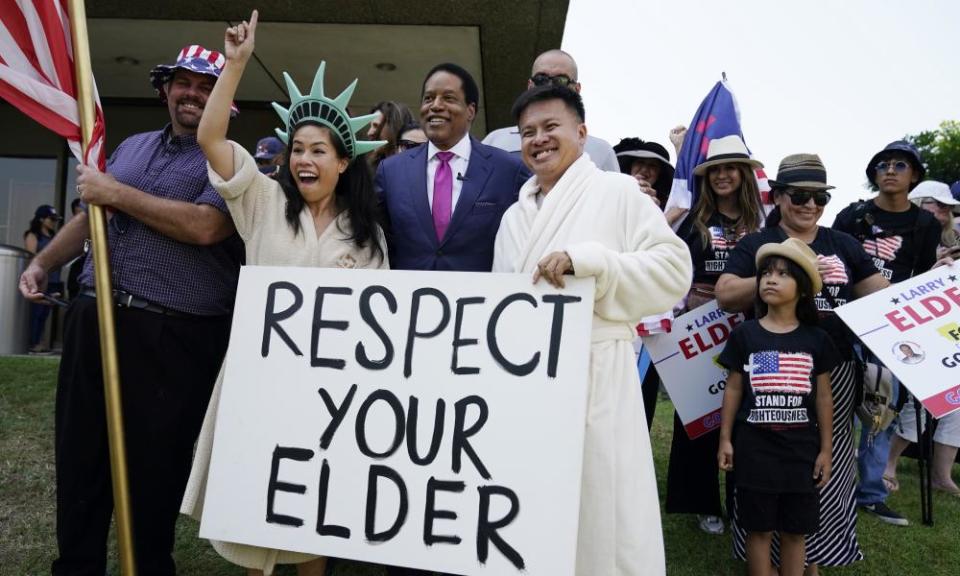Apathetic voters could hand California recall to Republicans: ‘Folks seem unaware’
When Gavin Newsom was first elected governor of California in 2018, he captured a greater share of the vote than any other Democrat in state history. And he has remained broadly popular, despite a global pandemic, economic catastrophe, and a scandalously ill-timed visit to the Michelin-starred restaurant the French Laundry.
But with California’s gubernatorial recall election under way, Newsom is fighting for his political life. The Democratic governor of a deep blue state could narrowly lose his seat to a fringe rightwing radio host – in large part due to inertia and apathy among voters.
Democrats outnumber Republicans nearly two to one in California – but while the former are distracted and disengaged this year, the latter are riled up, political strategists and pollsters say. By voting at higher rates, Republicans could capture the governor’s seat for the first time in a decade.
Related: ‘A complete shock’: the rightwing contrarian leading the California recall race
Only 36% of all registered voters want to oust Newsom, but that number rises to 47% when polling likely voters, according to a poll by the UC Berkeley Institute of Governmental Studies. And a recent CBS News poll found that 72% of Republican voters were “very motivated” to participate in the recall, while just 61% of Democrats felt the same.
“Turnout is likely to be far higher among Republicans than Democrats and ‘no party preference’ voters. And, since nearly all Republicans favor Newsom’s ouster, a larger proportion of likely voters are voting yes,” said Mark DiCamillo, the poll’s director.
Newsom spent the past few months characterizing the recall effort as a fringe, Republican “distraction” and kicked off his “Vote No” recall campaign in earnest just one month before the 14 September deadline to return ballots. Now he and the Democratic party are scrambling to mobilize voters. “People, we implore you: please vote,” he pleaded at a recent campaign event in Los Angeles.
“Newsom doesn’t have to worry about the Democratic base voting for the recall,” said Dan Schnur, a politics professor who has advised Republican candidates. “He has to worry about them not voting at all.”

The dynamics of the race are in part due to California’s peculiar recall system. The ballot asks two questions. First, should the governor be recalled? And if so, who should be governor? If more than 50% vote yes on the first question, the candidate with the most votes on question two becomes governor. That means that if 49.9% of voters support Newsom’s staying in office, he could be replaced by a candidate earning far fewer votes, such as the Republican frontrunner and rightwing radio host Larry Elder, who leads the polls among replacement candidates with just 18% support.
“They’re hoping that Democrats are just not interested enough,” said James Lance Taylor, a political scientist at the University of San Francisco, of the crowded Republican field. “That not enough Democrats will return the ballots, allowing Elder to sneak in the back door and become governor of California.”
Democrats up and down the state are growing increasingly nervous about that possibility.
“I’m very concerned by the close poll numbers and very concerned with the fact that folks seem distracted or unaware,” said Sydney Kamlager, a Democratic state senator and vice-chair of the California legislative Black caucus who has been urging constituents to vote against the recall.
Amid a still-raging pandemic and devastating wildfires, many Californians are too preoccupied to pay attention, said Christian Arana, a vice-president of the Latino Community Foundation. And that’s especially true for the Black and Latino voters who help propel Democrats to power year after year. Polls suggest that white, conservative voters will dominate the recall, while voters of color stay home.
“Latino communities are still being affected by this virus, especially with a Delta variant going on. We’ve continued to see deaths within our community,” Arana said. “This recall election is just not on our mind, because we’re so busy dealing with the pains and traumas of this virus, and its economic consequences as well.”
Latinos account for 39% of the population, and about 28% of registered voters. While Latinos voted for Newsom by an almost 2-1 margin in 2018, the CBS News poll found that among likely voters, about half of Hispanic voters would vote to recall Newsom.
Related: California’s governor recall election is heating up. Here’s what you need to know
So now Governor Gavin Newsom is crisscrossing the state to make his case, meeting with a small business owner in San Diego’s Barrio Logan and with supporters at a Los Angeles Mexican restaurant. He’s made an appeal to progressives alongside the US representatives Karen Bass of Los Angeles and Barbara Lee of Oakland. And this week, he’s having Kamala Harris join him on the campaign trail in the hope that the vice-president can energize voters.
“The stakes of this election couldn’t be higher,” he said in a statement announcing the vice-president’s arrival.
So far, Newsom and Democrats have focused more on those “stakes” than almost anything else – characterizing Elder’s ascent as a worst-case scenario. “Why is it important to focus on Larry? Well, to put in perspective what’s at stake here,” Newsom said at a campaign event. “Some say he’s the most Trump of the candidates. I say he’s even more extreme than Trump.”
But among an electorate that is burned out on fear and trauma, the tactic could backfire, political strategists said. “Campaigns need to provide a message of hope,” said Arana. “A reason for communities to stand with them.”
This article was amended on 25 August 2021 to clarify that Republicans hadn’t captured the governor’s seat in a decade.

